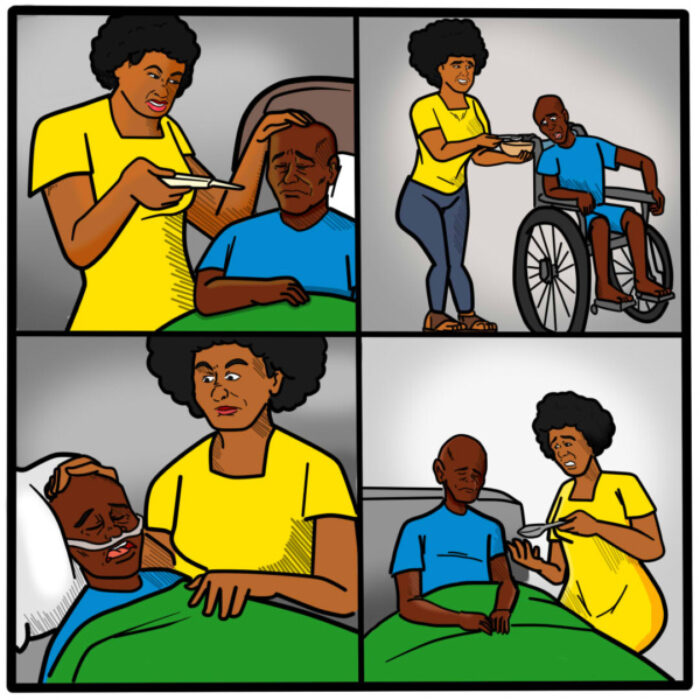By Nnaoke Ufere, PhD
Life is a fleeting gift, one we often take for granted. We move through our days making plans for the future, assuming that tomorrow will come as predictably as the rising sun. But what if it doesn’t? What if, in an unanticipated moment, our journey ends? Will those we leave behind know how to piece together the fragments of our lives?
Will they find what truly matters—your intentions, your plans, your legacy, your love, and the critical information they need to carry on your dreams, honor your wishes, and secure their future in your absence?
The thought of our mortality is uncomfortable, yet necessary. Death is inevitable, but chaos for our loved ones doesn’t have to be. Preparing for the unexpected is an act of love, a gesture that says, “I care enough to make this as easy as possible for you.” However, many fail to leave behind clear guidance on the practical and emotional essentials their families will need.
Emma Obiorah was an emergency room physician in Alabama, a man who had dedicated decades of his life to saving others. He emigrated to the United States in pursuit of a better future and became the cornerstone of his family’s stability. Married to Ngozi, his devoted wife, and a proud father of four children, Emma was the sole breadwinner, shouldering the responsibilities of both provider and protector.
On that tragic night, while driving home from a long shift at the hospital, his car collided with a disabled truck obscured by the dense early morning fog. The police delivered the devastating news of his untimely death to Ngozi, shattering the lives of a family that had relied so heavily on his strength and leadership.
In the aftermath of his passing, chaos reigned. Ngozi and the children found themselves grappling not only with overwhelming grief but also with an avalanche of unanswered questions.
Did Emma have a Will? Where was it? Had he expressed a preference for cremation or burial? Should he be laid to rest in the United States, where his family called home, or returned to his ancestral village, where generations of his lineage were rooted? The confusion deepened as they realized they had no knowledge of his financial assets.
Emma’s accounts—how many were there, and with which banks? Where were the login credentials, PINs, and account numbers? Who were the designated beneficiaries, if any? What about his retirement accounts, investments, and life insurance policies?
What about the pension details from the hospital where he worked in Nigeria before emigrating to the U.S.? What is the extent of his ownership interest in the Enugu hospital he invested in, and where are the related documents? These unanswered questions become overwhelming burdens for grieving hearts already stretched thin.
Mortgage payments—were they up-to-date, and who else was listed on the documents? The car loans, credit cards, and other debts? Did he owe anyone, or did anyone owe him? Did he pay his federal and state taxes?
And what of the numerous plots of land and rental property he owned in Nigeria, the mansion in his village, and their corresponding documents of ownership? Were there secret children whose existence might come to light?
Every bill—from home insurance, family health insurance, and car insurance to utilities, cell phones, lawn care, and countless subscriptions—had been managed by Emma. Every password, every account detail, every essential record and digital assets resided solely in his memory and custody.
Now, in his absence, Ngozi and the children faced a logistical nightmare. They had no road map to navigate the maze of Emma’s life, and every step forward felt like grasping at shadows in the dark.
Beyond the practical chaos lies an emotional void—questions of intentions left unspoken. What dreams did he harbor for his children? What values did he hope to pass down?
What relationships were left unresolved, and how would Emma want those to be mended? Without a clear roadmap, these critical pieces of his legacy were lost in the ether.
Countless families resemble the Obiorahs, where the husband maintains complete control over critical information that impacts the entire household. The wife and children are neither informed nor feel obligated to know where this information is stored or how to access it—until death forces them to confront the void. It doesn’t have to be this way.
The Practical Essentials: Preparing for the Unseen
Preparation is essential for anyone who values their loved ones’ peace of mind. Every individual, regardless of their net worth, should leave behind a clear and accessible plan, organized as follows:
1. Financial Information
Document and organize your financial records to help loved ones manage your affairs:
- Bank Accounts: Include names, account numbers, branch addresses, contact numbers, website URLs, login credentials, PINs, BINs, and security questions with answers. Make sure to designate beneficiaries for your bank accounts. If you haven’t done so yet, act without delay. Without designated beneficiaries, the bank will require a lengthy probate process before releasing the funds after your death.
- Insurance Policies: Record policy numbers, provider details, coverage summaries, and beneficiary information.
- Pensions and Retirement Accounts: Provide account numbers, administrators, balances, and instructions for withdrawals or transfers.
- Investments: Detail stocks, bonds, mutual funds, ownership documents, and broker contact information.
- Debts: Include loan agreements, balances, payment schedules, and creditor contacts. List any debts owed to you, including the debtor’s name, the amount owed, and any relevant details.
- Home Mortgage Records: Record loan numbers, lender details, and payment information.
- Property Ownership: Collect all titles, deeds, and related legal documents.
- Business Ownership: Include agreements, shares, and equity details.
- Taxes: Document federal and state taxes owed, filing history, and tax preparer contact information.
- Household Bills: Provide instructions and login credentials for utilities and recurring payments.
- Legal and Professional Contacts: Include contact details for your lawyer and religious leader, if applicable.
2. Household Documents
Create a comprehensive spreadsheet with the following details:
- Debit and Credit Cards: Record credit card numbers, balances, schedules, and customer service contacts. Add debit card PIN.
- Health Insurance Provider and Identification Documents: Include health insurance cards from all providers – medical, dental, drug, eye, etc., Social Security cards/NIN, driver’s licenses, and passports.
- Birth Certificates: Record physical file locations.
- Utility Accounts: Document account numbers, login credentials, and provider contacts.
- Home Wi-Fi and Cell Phone Credentials: List PINs, passwords, and setup details.
- Healthcare Information: Include medical records, vaccination histories, and doctors’ contact details.
- Subscriptions: Record login credentials and billing details for online services.
- Home Security Systems: Provide alarm codes, login credentials, and provider information.
- Safe or Safe Deposit Box: Record location, access codes, and inventory.
3. Legal Documents
Organize and update essential legal documents:
- Wills and Trusts: Create or update a will using a lawyer or online tools like WillMaker or LegalZoom. Appoint a trusted executor and designate powers of attorney for financial and healthcare decisions.
- Power of Attorney: Draft a document to allow an agent to make decisions on your behalf. Specify authority, effective dates, and whether it’s durable.
- Marriage and Divorce Certificates: Store where they can be easily accessed.
- Court Orders and Legal Notices: Clearly file custody agreements, settlements, or ongoing legal cases.
4. Digital Legacy
Document passwords and access information for social media, cloud storage, and subscriptions.
5. Personal Wishes
Write down your preferences for funeral or memorial services to guide your family. Include in your will or list seperately.
6. Personal Letters and Mementos
Leave heartfelt messages or tokens for loved ones as lasting reminders of your love and guidance.
Storage and Access
- Storage: Save information on a flash drive and as a hard copy.
- Security: Use a secure but accessible location, such as a fireproof safe or locked cabinet.
- Updates: Regularly review and update records to reflect changes.
- Accessibility: Ensure your spouse and adult children know the location and how to access these documents.
By organizing these essentials, you provide your loved ones with clarity and support during challenging times.
Your Legacy: Preserving What Truly Matters
Practical preparations are only part of your legacy. The most enduring aspects of your life—your love, values, and lessons—must also be passed down. Legacy isn’t about material possessions; it’s about the lasting impact you leave on the hearts of those you cherish.
Take time to document your family’s history, the values that shaped you, and the principles that guided your decisions. Share your hopes for your children and grandchildren, express forgiveness, and ask for it in return. These intangible gifts will remain with your loved ones long after material wealth has faded.
The Courage to Begin
It’s natural to avoid difficult conversations, but procrastination only increases the burden on those you love. By starting today, you take a powerful step toward relieving future uncertainty. Your preparation ensures that your voice, love, and intentions will still be heard when you’re no longer there to speak for yourself.
A Final Act of Love
“If tomorrow never comes,” the song asks, “will they know how much I loved them?” This question isn’t just about words spoken in life but about actions taken to provide care and clarity in death. Preparing for the unseen isn’t morbid—it’s one of the deepest expressions of love.
The greatest gift you can give your family is peace of mind. Make sure they know where to find what matters most: your guidance, wishes, and love. Begin today, because tomorrow isn’t guaranteed. If tomorrow never comes, let your legacy and love be the light that carries them forward.





